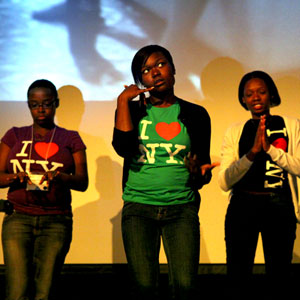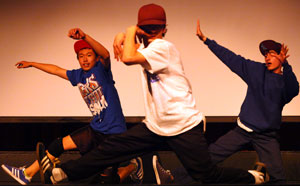Humans are amazing creatures, able to thrive under seemingly impossible conditions. An individual’s success is related to resilience and this is a quality researchers around the world want to better understand.
Enter Michael Ungar – principal researcher with Dalhousie’s Resilience Research Centre (RRC) – who believes resilience is more than a person’s capacity to overcome problems. “It’s also all the things a person needs to make it more likely they will overcome the odds stacked against them,” says Dr. Ungar.
 |
| Members of The Polling for Justice Project present a day in the life a New York City teen.¬Ý (Photo Bruce Bottomley) |
Polling for Justice consists of five teens and colleagues from New York City who share research far and wide – but not in typical fashion.
‚ÄúJust projecting charts and stuff is so boring,‚Äù says Maybelline¬ÝSantos of the Polling for Justice Project. ‚ÄúWho‚Äôs going to take part in a meeting where they‚Äôre bored all the time?‚Äù This group needs the attention of audience members to help spread their message of teens and social injustice in New York City. Polling for Justice provides a call to action for youth and young adults around the world, sharing the injustices faced by teens and seeking to understand ways to make a better tomorrow.
A combination of theatre, dance and improvisation is used to share information from more than 1,000 surveyed youth in areas of education, public health and criminal justice. “We decided that we wanted to show them in a way that used our bodies,” says group member Jaquana Pearson. “Basically, we’re trying to embody (our data) so (people) have a better understanding of what’s going on.”
“We want to tell everybody what it’s like to be an urban teen, or a teen in New York City, because it’s not all as exciting as it sounds – it’s difficult,” says Darius Francis of Polling for Justice.
Michelle Fine teaches at the City University of New York and a member of the Participatory Action Research Collective. Upon being invited to present at the resilience conference she gathered performers from Polling for Justice, which she helped to develop in 2008.
“We sought to understand what young people desire, and the ways in which state, national and global policies are dispossessing them,” says Dr. Fine. “That is, taking away their very human rights to education, health care, housing, and what we might sincerely call human security: the ability to believe that tomorrow will be better than today.” The evening’s opening act – Concrete Roots – is an example of teenagers who have taken another approach, which has already improved their quality of life.
 |
| Concrete Roots show what they are made of. (Photo Bruce Bottomley) |
“Break dancing is a misconception,” says Drew Moore, who co-founded Concrete Roots in 2008. Mr. Moore’s b-boy name is Daroo. “If you’re a ‘breakdancer’ it means you’re someone who doesn’t fully understand the culture.”
And there is quite a culture to understand. In fact, b-boys and b-girls live an entire lifestyle. For example, “… we wear bright shoes because it draws attention to our feet for our footwork,” says Mr. Moore. “They don’t just become b-boys when they’re on the dance floor, they’re b-boys all the time. That means if you’re confident in the circle, you have to be confident all the time.”
This confidence shows. Several members of Eastern Bloc didn’t speak English when they joined just over a year ago but during the conference’s special event, each dancer took the microphone to recount his experience as a b-boy.
“You don’t even want to go out and make trouble anymore if you’re a trouble maker,” says George Gregoryan a.k.a. Spike Nice. “You would want to go into the studio and be with your friends because it’s that energy when you practice that keeps you out of the streets and out of trouble.”
Next month, Concrete Roots is going to the Yukon. “We got invited to go to Cypher for Change, a national forum for youth to learn how they can enact positive change in their communities,” says Mr. Moore.
Resilience is an element shared between the Polling for Justice Project and Concrete Roots; both groups strive toward success for young people, perfectly embodying the goal of the Pathways to Resilience conference.
